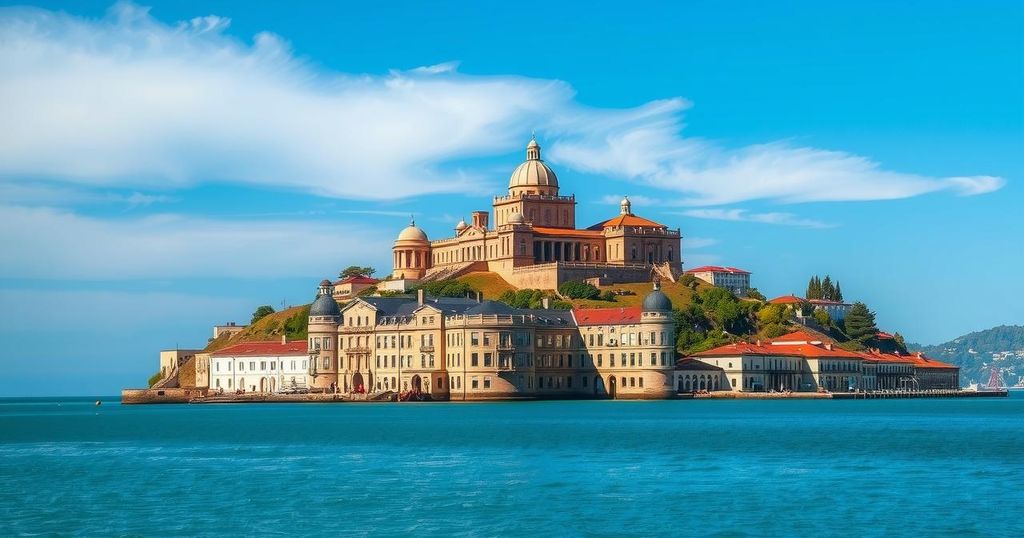Celebrity
ALCATRAZ, AMAZON, ASIA, AUSTRALIA, BRITAIN, CANADA, CUBA, DISNEY, ECONOMICS, EUROPE, GLOBAL_ISSUES, HOLLYWOOD, HUNGARY, JAMIE, JAMIESON GREER, MARKETING, MEXICO, NATIONAL SECURITY, NETFLIX, NEW ZEALAND, NORTH AMERICA, OCEANIA, PHILIPPINES, TRADE, TRUMP, U. S, UNITED STATES, WARNER BROS, WASHINGTON
Fatima Alavi
0 Comments
Trump’s Controversial Proposals: Tariffs, Alcatraz Revival, and Military Aid in Mexico
President Trump proposed a 100 percent tariff on foreign movies, citing national security threats, while also expressing interest in reviving Alcatraz as a maximum-security prison. He confirmed pressing Mexico for military assistance against drug cartels, which was rejected by Mexico’s president. These statements have prompted significant discussion across various sectors.
In a series of significant and somewhat controversial statements over the weekend, President Trump raised several issues regarding national security and movie production. He has suggested imposing a 100 percent tariff on foreign films, arguing that they threaten U.S. national security. His comments on social media, made Sunday, prompted confusion about the scope of such a tariff. It remains unclear if this applies to all foreign films or merely those benefiting from international tax incentives.
The Motion Picture Association, which includes major studios, did not comment on Trump’s declaration. In a 2023 report, the association detailed that the American film industry maintained a positive trade balance worldwide. Despite a good deal of productions being homegrown, filmmakers increasingly turn to international locations due to lower costs, which has been detrimental for many domestic workers in the industry.
Indeed, thousands of jobs for California film workers have vanished, with roughly 18,000 positions lost over the past three years, as reported by the International Alliance of Theatrical Stage Employees. This decline has been attributed to more productions moving abroad due to tax incentives and lower labor costs. As the industry contracts, California leaders, including Governor Gavin Newsom, are pushing for enhanced tax credits to keep film work local.
In addition to his remarks on film tariffs, President Trump also discussed potentially reviving the infamous Alcatraz prison. He stated a desire for federal law enforcement agencies to restore Alcatraz as a maximum-security facility, citing safety concerns and claiming it would be a deterrent against rising crime rates. Critics, including state officials in California, have dismissed this proposal as unrealistic and poorly thought out.
“Looks like it’s Distraction Day again in Washington, D.C.,” remarked a spokesperson for Governor Newsom, pointing out the impracticalities of reopening a facility that has been a museum for decades. Newsom’s aides noted that this would require considerable resources at a time when budget cuts are being rolled out across federal agencies.
On the international front, President Trump confirmed he urged Mexico’s President Claudia Sheinbaum to permit U.S. troops to assist in combating drug cartels. Sheinbaum rebuffed the suggestion, asserting that the two nations could cooperate but should maintain their sovereignty. Trump characterized the situation regarding drug cartels as dire, claiming they have been responsible for widespread violence and drug-related devastation in the U.S.
Additionally, former Proud Boys leader Enrique Tarrio met with Trump at Mar-a-Lago, where he thanked the President for a recent pardon that drastically shortened his prison sentence for charges connected to the Capitol riot on January 6, 2021. During the meeting, Tarrio described Trump as sympathetic to those facing charges stemming from that day, indicating that he felt grateful for the second chance afforded by the clemency grant.
As the political landscape continues to evolve, with comments and proposals emerging from the Trump administration, the implications of these decisions remain to be seen. The President’s focus on both domestic issues, such as the movie industry’s struggles, and international relations concerning drug cartels, hints at a complex strategy moving forward, albeit one that draws scrutiny from various sectors.
President Trump’s recent proposals, which include tariffs on foreign films and the revival of Alcatraz as a prison, have sparked considerable debate. In addition, his push for U.S. military assistance in Mexico to combat drug cartels was firmly rejected by the Mexican president. These moves reflect a contentious yet strategic approach to national and international issues as the political climate shifts.
Original Source: www.nytimes.com




Post Comment